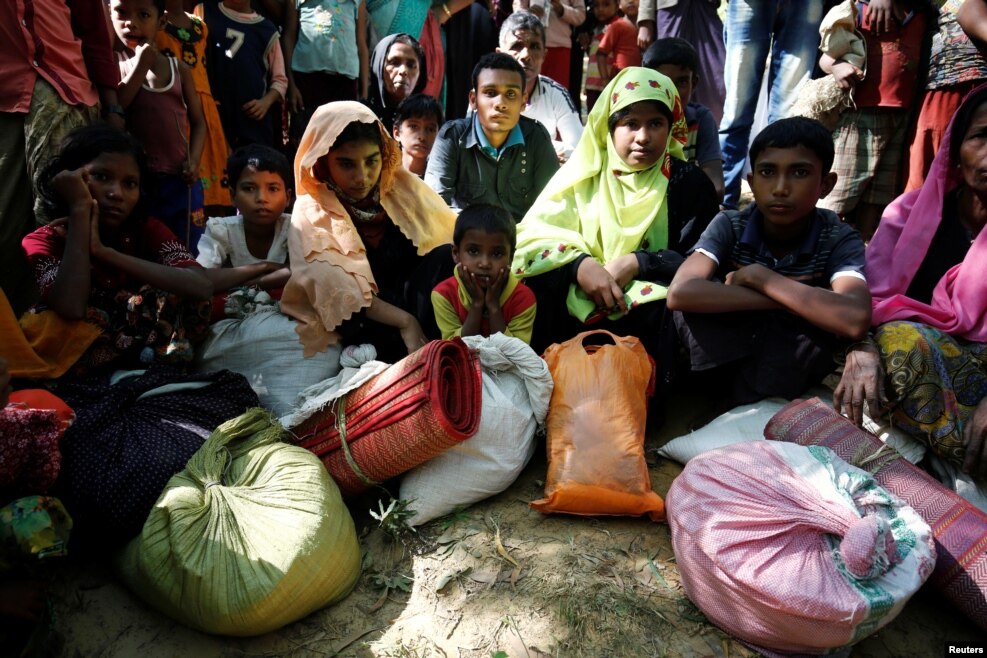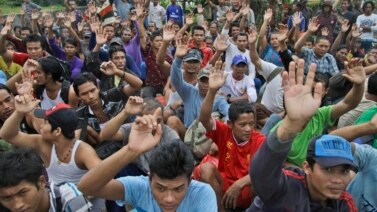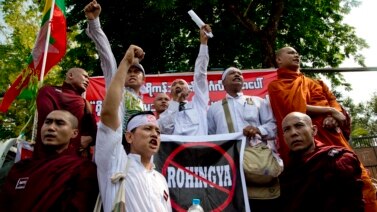
Aid agencies and rights groups say about 25,000 members of the ethnic group known as Rohingya have crossed into Bangladesh since October. They are fleeing violence as the government fights rebels in Rakhine state.
Many of the new arrivals are saying that Myanmar's security forces are attacking civilians. Some rights groups say satellite pictures support claims that whole villages have been burned to the ground.
For Gul Jahar, there is nothing left to go home to. Her three sons disappeared during an attack in November.
She describes how soldiers came to her village and carried out violence.
"The soldiers burnt down all the houses and everything we had in our village. The rice that we kept in a barn - they burnt it all. We had nothing left," she said.
Abu Tha Heck, who traveled to Bangladesh with his wife and four of his six children, tells of witnessing Myanmar security forces committing rape.
The shop owner and farmer left his house and land behind. He still does not know where two of his sons are.
Government response
The government denies that abuses have taken place.
A statement posted to the Ministry of Information's website on December 19 criticizes the international community for putting pressure on Myanmar's government.
Kyaw Moe Tun, the director general of the Myanmar Ministry of Foregin Affairs, says accusations of abuse are not helpful.
But he said that the government is ready to work with those who provide evidence of suspected crimes.
"Whoever has [that] kind of information, please bring [it] forward and give use the concrete evidence. Then, the government is ready to look into the matter," he said.
In an interview with IRIN news, Foreign Ministry spokeswoman Aye Aye Soe said, "The things they are accusing us of didn't happen at all." She added "I am sure there are people going over the border, I accept that, but I don't know if it could be 20 or 30 thousand. It's blown out of proportion."
NGOs Dispute the Government's Claims
However, human rights groups dispute the government's statements. They say that evidence shows Myanmar's military is committing rights abuses.
In a report published in mid-December, Amnesty International says that satellite pictures show that about 1,200 Rohingya homes have been burned.
The government says that Rohingya militants have burned the homes. But, Amnesty says, eyewitness reports and satellite pictures show that the burning patterns are "consistent with targeted and systematic attacks by the military."
Another human rights group, Human Rights Watch, says other satellite imagery shows the government is behind the burnings.
The images show a military post next to the village of Wa Peik, where around 300 buildings have been burned.
Brad Adams, the Asia director at Human Rights Watch said, “It's difficult to believe that militants burned down over 300 buildings in Wa Peik over a one-month period while Burmese security forces stood there and watched.”
Foreign reporters and humanitarian groups have been banned from going to the northern parts of the Rakhine state, making it difficult to document violence in the area.
Several journalists will be permitted into the area this week, but it is not clear how freely they will be able to travel.
I'm John Russell.
Steve Sanford wrote this story for VOA News. John Russell adapted it for Learning English with additional sources of information. Mario Ritter was the editor.
We want to hear from you. Write to us in the Comments Section.
Words in This Story
commit - v. to do (something that is illegal or harmful)
concrete - adj. relating to or involving specific people, things, or actions rather than general ideas or qualities
systematic - adj. using a careful system or method
blow out of proportion - expression. to think of or describe something as larger or greater than it really is

